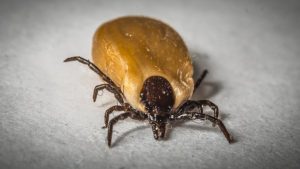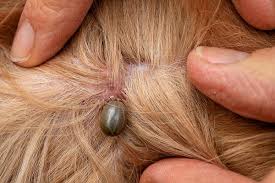
Tick-Borne Diseases in Horses are on the Rise.
This years unusual weather patterns seem to have given rise to tick populations. Ticks have become a year-round concern in many parts of the U.S., and now with fall just around the corner it’s time to become especially tick savvy in order to protect our horses from tenacious tick-borne diseases. Ticks are most prevalent in spring and in fall and it seems they may have become more pervasive in fall than they were just a few short years ago.
Tick-Borne diseases are rampantly spreading throughout the US at the highest rates ever and are being found in a growing number of new regions around the country. Asian Long Horn ticks are killing livestock (and wildlife such as moose) by literally draining them of blood. Lyme Disease is being diagnosed at alarming rates. And more tick related concerns and diseases keep appearing all the time.
The tick’s reliance on blood-feeding has unfortunately allowed it to function as an effective transmitter of microscopic pathogens. There are over 900 species of ticks recognized worldwide. Different pathogens have adapted to different species of ticks. Consequently, a variety of diseases can be transmitted by ticks to mammals and birds.
Arguably the most notable of them is Lyme Disease.
Lyme Disease is an infectious disease caused by the bacterium Borrelia burgdorferi. Lyme Disease is transmitted by deer ticks and was first diagnosed in a human in 1975. Today it is estimated to be diagnosed in about 30,000 people in the United States each year.
Large nationwide studies examining exposure of horses to Lyme Disease are lacking, but smaller studies have estimated that greater than 50 percent of horses in the northeastern states have been exposed to the pathogen. Fortunately, in healthy horses the infection does not necessarily translate to disease.
In some cases, Lyme is capable of causing diseases associated with the nervous system.
Signs in these horses include ataxia, hyperactivity, difficulty swallowing, and muscle atrophy. These symptoms overlap with several other common equine diseases making it difficult to accurately diagnose.
Lyme Disease is not the only tick-borne disease concern for horses. Anaplasmosis, which is also transmitted by deer ticks, can result in acute fever, lethargy, and swollen limbs. Fortunately, anaplasmosis responds well to antimicrobial therapy.
Horses that may incur exposure to ticks should be routinely checked over for ticks, especially after activities such as trail rides. Looking for ticks on horses requires using both your eyes and your hands. It is always best to examine your horse systematically, starting at the nose and working backward to the tail. If a tick is found attached to a horse, it is best to remove them using a Tick Twister rather than trying to pull them out with your fingers.
If a horse has been diagnosed with a tick-borne disease, or is suspected to possibly have a tick-borne disease, adding supplements to their daily regimen may be helpful in their recovery and ongoing health. Tic X by Hilton Herbs provides a wonderful immune support supplement for horses and dogs.
To prevent horses from getting ticks on them in the first place there is Ticks-Off®. Ticks-Off® is the revolutionary new, safe, and effective natural Solution for keeping animals safe from tick bites. Ticks-Off® is the one and only tick Deflective Spray.
Disclaimer: Ticks-Off, nor any third party associated with, related to, or linked to their businesses or websites, expressly disclaims any responsibility for, and makes no representations or warranties regarding, any statement, information, materials, or content found on or included in Ticks-Off’s marketing materials/websites, or any third party marketing materials/websites related to, associated with or linked to Ticks-Off’s business or website. Ticks-Off’s website and blogs are not intended to diagnose or treat any health conditions. They are meant solely for informational purposes. Please seek veterinary advice for any health concerns or problematic conditions. These statements have not yet been approved by the FDA.

